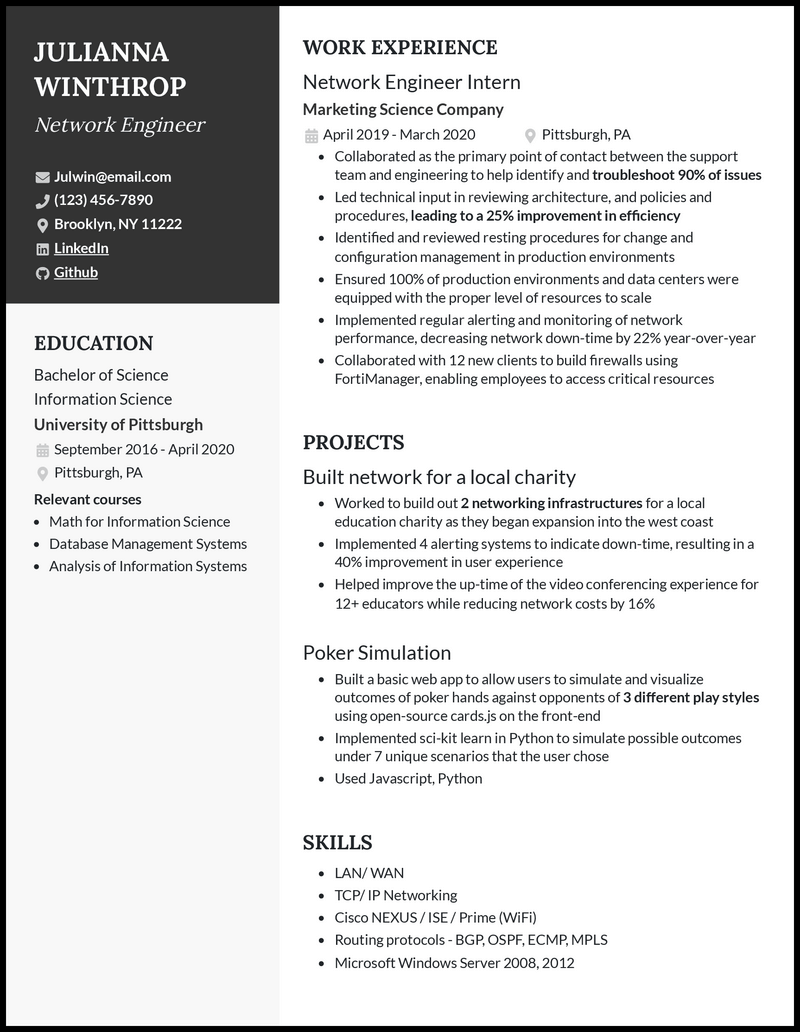You’ve already taken your first steps into the world of network engineering. From monitoring to troubleshooting and fixing issues as soon as they pop up, you’re all set to keep tabs on both performance and security.
When you’re breaking into a highly competitive field, building a resume that adequately describes your most important skills is crucial—but how do you do that in a way that stands out?
That’s where we come in. Our entry-level network engineer resume templates, tips, and free cover letter generator will show you how to navigate to job market in the direction of a stellar career.
Why this resume works
- This entry-level network engineer resume does a great job of having just the right amount of skills, projects, and internship experience. Most newcomers will possess only one standout aspect, so having all three gives that extra bit of charisma you need to lure in employers.
- But don’t try and go overboard. Keep networking skills at a maximum of 5 while summarizing your project in 2-3 points.
What Matters Most: Your Network Engineering Skills & Experience

When you’re starting out, the “skills” section of your resume plays a major role in landing new interviews. Recruiters quickly scan it, often with the help of applicant tracking systems (ATS), to make sure that you meet the criteria for the job.
Since your job is all about complex network maintenance and troubleshooting, let your resume reflect that. Leave out generic terms like “quick learner.” Instead, dive deep into your technical skills and knowledge of network engineering.
Talk about your proficiency in load balancing, disaster recovery, and VPNs, but also mention all the network and routing protocols you’re well-versed in.
Remember that you will probably be asked to elaborate on these skills during the interview, so only add abilities you’re feeling confident in—it’s okay if you don’t include everything listed in the job description.
9 best entry-level network engineer skills
- Cisco IOS
- Wireshark
- Network Configuration
- Security Protocols
- TCP/IP, LAN/WAN
- VPN Management
- Network Monitoring
- BGP, OSPF, ECMP
- Cloud Computing
Sample entry-level network engineer work experience bullet points
You might feel like you have no achievements to speak of here just yet, but don’t worry—you’ve already got plenty of interesting talking points.
Think back to your list of skills and find ways to circle back to them to show how you were able to make an impact in your past projects and roles.
To make the emphasis even stronger, include quantifiable metrics and help them tell the tale. It’s a lot better to say that you “optimized network connectivity for 500+ endpoints, resulting in 15% less downtime” rather than just saying that you “performed network optimization.”
Here’s how you can showcase your past experience:
- Assisted with installing and configuring a new office network infrastructure, improving system efficiency by 25%
- Supported a successful migration of company services to the cloud, leading to a 20% reduction in infrastructure costs
- Leveraged Ansible to help automate network monitoring, reducing manual workload by 27%
- Utilized Wireshark to streamline the network troubleshooting process, resulting in a 36% reduction in issue resolution time
Top 5 Tips for Your Entry-Level Network Engineer Resume
- Highlight your certifications
- Display any relevant certifications, like the CCNA or CompTIA Network+, on your resume. While most roles won’t require them, they’re a great addition.
- Stay aware of current trends
- The world of IT is ever-evolving, so it’s good to show your passion for network engineering by keeping up with the latest trends. Talk about the resources you’re always checking for news about cloud computing or IoT as well as any conferences you’ve attended.
- Show that you’re on top of security
- Cybersecurity is a hot topic these days, and knowing how to stay on top of it is crucial to your role. Emphasize your interest in network security by talking about security measures you’ve instated, such as using Nessus to reduce vulnerabilities.
- Emphasize your customer service
- If you have any experience offering technical support to non-technical end-users, mention it. For instance, highlight the time you offered remote support to a local charity to help it upgrade its network—this will convey to recruiters that you know how to simplify complex topics.
- Dive deeper into your technical prowess
- Show exactly how you were able to leverage your toolkit to deliver positive outcomes. Don’t just state that you’ve used Cisco IOS; instead, elaborate on this by saying that you “leveraged Cisco IOS to manage a network of 300+ devices, improving network efficiency by 10%.”
Think of your cover letter as an opportunity to dive deeper into your education and past experience. Talk about challenges you faced when you used GNS3 to build out a network simulation for a personal project, and how you had to employ a creative problem-solving approach to overcome them.
For an entry-level role, it’s a good idea. Make sure that you express how you relate to the company’s mission and that you want to stay there for the long run, including an example career path from a junior to a senior engineer.
Read the job description carefully and pinpoint the main focus of the role, then reflect that in your resume. For instance, if the role emphasizes network maintenance and end-user assistance, include mentions of your past tech support experience.










